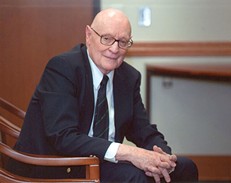“We need more welders and less philosophers,” U.S. Sen. Marco Rubio recently proposed in a Republican presidential debate.
Nicholas Rescher understands what Rubio means. “There’s a traditional saying that ‘philosophy bakes no bread,’ and in a certain way, it’s true,” he acknowledges. But Rescher, a philosophy professor who’s taught at the University of Pittsburgh since 1961, also begs to differ (and not just because welders can also be philosophers, and vice versa). Philosophy, Rescher says, has a vital role to play, not least by helping people to think and write more clearly about basic issues of everyday life.
Rescher, well known in philosophy circles for his academic writings, seeks to widen philosophy’s reach with his new book A Journey Through Philosophy in 101 Anecdotes (University of Pittsburgh Press). The book recounts and comments on stories, ideas and thought experiments from the history of Western civilization, ranging from the Tower of Babel, Aesop and Aristotle to modern thinkers like mathemetician Alan Turing and deconstructionist Jacques Derrida.
“Heraclitus’s River” explores the nature of reality (“you can’t step in the same river twice”); “Plato’s Republic” asks which matters more, good laws or good men. Rescher also winnows through examples from literature (“Dr. Faustus’s Bargain”) and science (“Darwin’s Ape”) to show how they’ve affected civilization. Each chapter is just two or three pages. Rescher’s own favorites include “Saxe’s Puzzling Elephant,” from a 19th-century poem that gave us the parable of the five blind men and the elephant, and a lesson about how human perceptions are conditioned by our unavoidably limited experience.
Rescher, 87, was born in Germany; as a student at Princeton, he knew Einstein. He still teaches (“Contact with young people is what keeps one young”) and believes that philosophy must embrace big issues and assert itself outside of the academy.
Indeed, even in this career-focused era, he still perceives plenty of interest in philosophy, even among students planning to practice law or medicine.
Still, as Rubio’s comment suggests, much work remains. “Philosophy needs all the good press it can possibly get,” says Rescher.
“Less philosophers” is also a strange wish from a politician who nominally reveres the Founding Fathers, themselves no philosophical slouches. “The shadow of John Locke across the landscape of early America is large,” notes Rescher.
That suggests that philosophy is pretty practical after all. As Rescher says, “Anything that helps people get smarter is constructive in a democratic society.”















